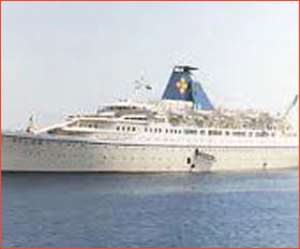
The Mills-led National Democratic Congress (NDC) government does not appear to be perturbed about the bad deals that are slowly consuming its administration.
The faux-pas that has characterized everything the government touches has manifested in the acquisition of two ex-German Navy Fast Patrol Boats which had been left to rot in a German Navy junk yard since 2005.
The ships were to be sent to the scrap yard but Ghana was desperate for them, doling out $38million to buy them for its operations in deep water patrol. The ships had no warranty according to official documents sighted.
Documents in the possession of DAILY GUIDE indicate that a memorandum on the deal, which was jointly signed by Defence Minister Lt. Gen. J.H Smith and Finance and Economic Planning Minister Dr Kwabena Duffuor, has received approval of Parliament for the disbursement of a whopping $37,867,500 for the purchase of the S143 retired ships, the Ex-Albatross and the Ex-Bussard, both former German Navy Fast Attack Craft Ships.
Germans have already decommissioned the ships.
Cabinet has already approved the decision in a confidential letter signed by the Secretary to Cabinet, Ben Eghan, dated June 10, 2010 sent to the Minister of Defence and copied to the Minister of Finance.
The letter noted that during its meeting on Thursday, June 3, 2010, cabinet supported the decision and asked for action to be expedited on it.
According to experts, the $37,867,000, which is being spent on the two junk-yard ships, can be used to purchase a brand new fast patrol boat with similar features.
The S143 class of German Fast Patrol Boats was commissioned by the German Navy in 1976 and decommissioned in 2005 after being used for 29 years.
Originally, the German Navy commissioned 10 S143 classes of fast patrol ships but due to operational problems, all 10 were grounded in 2005 and that is what Ghana has gleefully signed for.
In that same year, six of the decommissioned ships were sold to the Tunisian Navy at a cut-throat price of $30million and two to private individuals at undisclosed prices.
The remaining two had been earmarked for scrapping in 2007, after no interest was shown for their purchase.
Miraculously, the two survived the scrapping and three years after, the Government of Ghana (GoG), through the Ministry of Defence, is purchasing the scrap-bound ships at an unbelievable basic price of $22,990,500, plus an additional refurbishment cost of $14,877,000 for the two ships when all the six best ones were sold for a paltry $30,000,000 to the Tunisian Navy in 2005.
The two ships have a length of 7.8 metres, a displacement of 398 tonnes, speed of 40 knots (74km/h), a capacity of 40 people and an armament capacity of 2 x OTO Melara 76mm guns.
Due to wear and tear over the last 34 years, most of these excellent features are either not working or were stripped down by the German Navy when they were decommissioned.
The ships were demilitarized by dismantling of weapon systems as well as fire control systems, whilst respective racks or foundations remain empty.
Some platform equipment of the ships was also dismounted before decommissioning.
More importantly, the propellers are not working and will have to be fitted all over again.
The Government of Ghana is purchasing the junk ships on an 'as-is-condition' and the ships shall be delivered to and accepted by government without any guarantees whatsoever from the seller and refurbisher.
The life span of a fast patrol boat, as given by marine experts, is 45 years and with the 34 years already spent, the best the Ghana Navy will get out of the Ex-albatross and Ex-Bussard ships will be nine years, all things being equal.
It is therefore not clear whether the acquisition of the two ships will be able to meet the intended purpose for which they are being purchased- to enhance the capacity of the Ghana Navy to ensure adequate maritime security and also effectively protect the country's emerging oil industry.
By Charles Takyi-Boadu




 This IMANI job no dey pap; the people you are fighting for are always fighting y...
This IMANI job no dey pap; the people you are fighting for are always fighting y...
 Prof. Naana Opoku-Agyemang has changed; you can see a certain sense of urgency –...
Prof. Naana Opoku-Agyemang has changed; you can see a certain sense of urgency –...
 MFWA Executive Director slams Akoma FM for engaging in ‘irresponsible’ media pra...
MFWA Executive Director slams Akoma FM for engaging in ‘irresponsible’ media pra...
 ‘Women must become millionaires too’ — Prof Jane Naana on establishment of Women...
‘Women must become millionaires too’ — Prof Jane Naana on establishment of Women...
 Some believe only in Ghanaian votes, not Ghana — Kofi Asare jabs politicians
Some believe only in Ghanaian votes, not Ghana — Kofi Asare jabs politicians
 Plan to make BEST sole aggregator of Sentuo Oil Refinery will create market chal...
Plan to make BEST sole aggregator of Sentuo Oil Refinery will create market chal...
 2024 elections: I can't have the man I removed from office as my successor — Aku...
2024 elections: I can't have the man I removed from office as my successor — Aku...
 2024 Elections: Immediate-past NPP Germany Branch Chairman garners massive votes...
2024 Elections: Immediate-past NPP Germany Branch Chairman garners massive votes...
 Gov’t focused on making Ghana energy self-sufficient, eco-friendly – Akufo-Addo
Gov’t focused on making Ghana energy self-sufficient, eco-friendly – Akufo-Addo
 April 25: Cedi sells at GHS13.74 to $1, GHS13.14 on BoG interbank
April 25: Cedi sells at GHS13.74 to $1, GHS13.14 on BoG interbank
